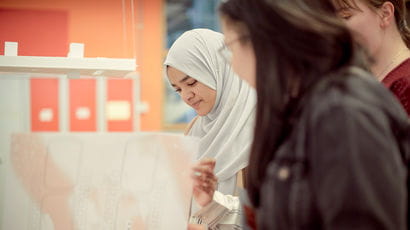Creating a tool to provide support for people affected by appearance-altering conditions or injuries
The development and testing of a new tool to facilitate the provision of support.
Introduction
An opportunity to apply for a funded full-time PhD in the Faculty of Health and Applied Sciences, UWE Bristol. The studentship will be funded by the VTCT Foundation and UWE Bristol.
REF: 2022-OCT-HAS03
The expected start date of this studentship is 1 October 2022.
The closing date for applications is Sunday 14 August 2022.
Studentship details
This is an exciting opportunity to conduct a funded full time PhD on the topic of support needs and interventions for people affected by appearance-altering conditions or injuries, such as burns, skin conditions, alopecia or cleft lip/palate. The successful candidate will benefit from the opportunities presented by being part of a thriving internationally known university research centre, the Centre for Appearance Research (CAR), focused on psychosocial aspects of appearance, including those associated with appearance-altering conditions. CAR has a strong, vibrant postgraduate community, and links with support organisations that work with people affected by visible differences.
The studentship is part of a larger programme of research funded by the Vocational Training Charitable Trust (VTCT) Foundation which aims to improve the lives of those living with an appearance-altering condition or injury. The supervisory team will include Diana Harcourt (Professor of Appearance and Health Psychology), Maia Thornton (Research Fellow at CAR) and Alex Clarke (Clinical Psychologist and Visiting Professor at CAR) who have extensive clinical and research experience relating to support needs and interventions for people affected by visible differences.
Living with a visible difference of any sort or being a parent/carer of a child with a visible difference, can present a host of psychosocial challenges. Some people manage the challenges they face very well, and might be considered well-adjusted and thriving as a consequence. But others struggle and could potentially benefit from intervention, such as that available through support organisations and psychosocial specialists. However, an ongoing challenge within the community of health professionals and support organisations working with people with visible differences, is how to identify those who might benefit from support, and what type and level of support they might find advantageous. Working in close collaboration with relevant charitable organisations, this PhD will develop and test a new tool to identify individuals’ particular support needs, and direct them to suitable psychosocial interventions that could meet these needs. The development and acceptability testing of this tool will involve mixed methods research, potentially including ‘think aloud’ methodology, and informed by approaches such as the Theoretical Framework of Acceptability (TFA).
The ultimate aim of this PhD is to provide health professionals and support organisations with a free, accessible and acceptable tool (with accompanying guidance) that will help them to identify those people with visible differences who might benefit from support and intervention, and the level and nature of intervention that could potentially meet their needs.
The precise details of the PhD will be finalised by the successful student, who will be supported to identify a unique focus to the research in order to make a novel contribution to research in this field, using appropriate methodology.
In addition to providing much needed evidence-informed resources for the benefit of the visible difference community, this PhD will also offer an excellent training opportunity to develop the specific research skills and expertise of an early career researcher looking to establish a career in the field of applied appearance/health psychology and/or visible difference research.
For an informal discussion about the studentship, please email Professor Diana Harcourt at diana2.harcourt@uwe.ac.uk
Funding
The studentship is available from October 2022 for a period of three years, subject to satisfactory progress and includes a tax exempt stipend, which is currently £16,602 per annum.
In addition, full-time Home tuition fees will be covered for up to three years
Eligibility
This would be a three-year, full-time commitment. This project is ideal for a self-motivated and enthusiastic student with a good honours degree (2:1 or equivalent) in psychology, and evidence of further study at Masters level or equivalent (e.g., MSc health psychology, clinical psychology). Knowledge and experience of the psychology of appearance and body image and qualitative and quantitative research methods will be highly desirable.
The studentship is open to citizens in the UK.
A recognised English language qualification is required.
How to apply
Please submit your application online. When prompted use the reference number 2022-OCT-HAS03
Supporting documentation
You will need to upload your research proposal, all your degree certificates and transcripts and your proof of English language proficiency as attachments to your application so please have these available when you complete the application form.
References
You will need to provide details of two referees as part of your application. At least one referee must be an academic referee from the institution that conferred your highest degree. Your referee will be asked for a reference at the time you submit your application, so please ensure that your nominated referees are willing and able to provide references within 14 days of your application being submitted.
Closing date
The closing date for applications is Sunday 14 August 2022.
Further information
Interviews will take place on Wednesday 31 August 2022. If you have not heard from us by Tuesday 26 August, we thank you for your application but on this occasion you have not been successful.
You may also be interested in

Contact the Doctoral Academy
Ways to contact the Doctoral Academy, from postgraduate research support to submitting your thesis.

Fees and funding
View Doctoral Academy tuition fees, project fees, completion fees and resubmission fees.

About the Doctoral Academy
Find out more about the UWE Bristol Doctoral Academy.

Research
Discover how research at UWE Bristol is making a real impact.
